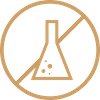Astaxanthin & Carotenoids
Astaxanthin
The microalga Haematococcus pluvialis, commonly known as Blood Rain Alga, is renowned for its impressive red colouration. This is caused by the carotenoid astaxanthin, which the alga produces as a natural protective mechanism against environmental stressors such as intense UV radiation, high temperatures, or nutrient deficiency. By storing astaxanthin, it can survive for years, even under extreme conditions. This valuable compound not only protects the alga itself but is also responsible for the striking colour of animals like salmon and flamingos, which consume astaxanthin through the food chain. Natural astaxanthin from microalgae inherently contains the original, full carotenoid spectrum of the alga.
Lutein & Zeaxanthin
Tagetes erecta, commonly known as marigold, is a flowering plant originally native to Mexico. It is frequently cultivated for its vibrant yellow and orange blossoms and plays a central role in Mexican culture. The petals of Tagetes erecta are a natural source of carotenoids, which include lutein and zeaxanthin in particular. In the plant, these pigments play a role in light absorption and in providing protection from environmental influences caused by sunlight. Lutein and zeaxanthin also occur naturally in the macula lutea (the yellow spot) and the lens of the human eye.
Vitamin C (Ascorbic Acid)
Vitamin C is a water-soluble vitamin. It exists in both its active form (ascorbic acid) and its oxidised form (dehydroascorbic acid), both of which are effective in the body. As an essential antioxidant, it plays a key role in neutralising free radicals. It is also an important cofactor for numerous enzymes that regulate energy metabolism and many bodily functions, including the formation of collagen for the normal function of the skin, bones and blood vessels, the normal function of the immune system and the improvement of iron absorption.
Vitamin E (Tocopherols)
Vitamin E, also known as the "cell protection vitamin", is a fat-soluble vitamin. It exists in eight different forms, the tocopherols and tocotrienols, of which alpha-tocopherol is the most biologically active and important form for humans. Vitamin E is a crucial, fat-soluble antioxidant that plays a key role in many bodily functions: among other things, it contributes to the protection of cell membranes from oxidative stress, the function of the immune system and blood clotting, and it supports cardiovascular health.
According to the European Food Safety Authority (EFSA):
- Vitamin C contributes to normal collagen formation for the normal function of blood vessels, bones, cartilage, gums, teeth and skin
- Vitamin C helps protect cells from oxidative stress
- Vitamin C contributes to the regeneration of the reduced form of vitamin E
- Vitamin E helps protect cells from oxidative stress


























